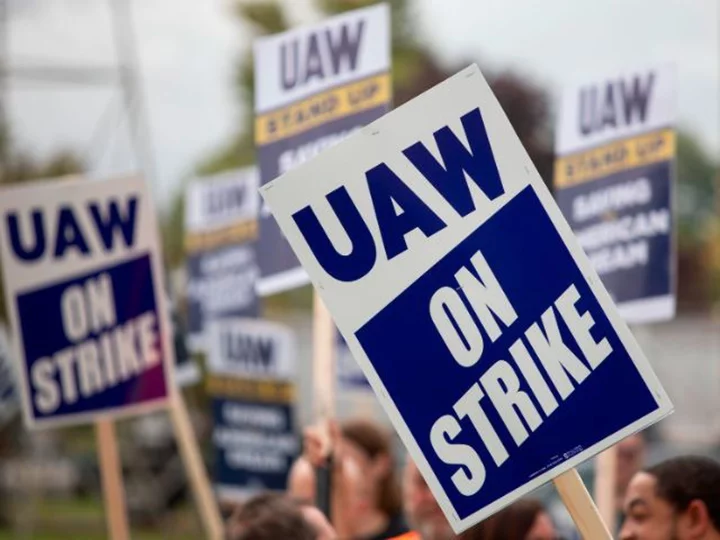Americans overwhelmingly side with unionized autoworkers in their ongoing strike against major car companies, a new CNN poll conducted by SSRS finds, even as most say that elected officials should steer clear of labor disputes.
Asked about the current United Auto Workers union strike against General Motors, Ford and Stellantis (which sells under the Jeep, Ram, Dodge and Chrysler brands), Americans side roughly 3-to-1 with the union members: 76% say their sympathies lie more with the workers on strike, with just 23% siding with the employers.
Among the roughly half of US adults who hold strong feelings about the strike, pro-labor sentiment is even more lopsided: 43% of all Americans side strongly with the workers and just 8% with the employers. Support for the striking workers is particularly robust among Democrats (56% sympathize strongly), members of union households (57%) and self-described liberals (61%).
While Democrats of all stripes side overwhelmingly with the striking workers, there are sharper divides within the GOP. Republicans in households making under $50,000 annually and those younger than 45 are significantly likelier than older Republicans and those making $100,000 or more to say their sympathies are on the autoworkers' side, with a smaller divide between those without a college degree and those who've graduated college.
Still, a 66% majority of the public says that elected officials should generally stay out of disputes between private employers and labor unions, with 28% saying elected officials should get involved in favor of union workers and just 6% saying that they should weigh in to favor the employers. While most Republicans and Democrats overall say that elected officials shouldn't get involved with labor disputes, there are pockets of the Democratic base that are more inclined to favor intervention on behalf of those striking: Roughly half of self-described liberals (53%), those with college degrees (52%) and those younger than 45 (48%) in the Democratic Party say that elected officials should weigh in to help workers.
President Joe Biden, who joined striking autoworkers on the picket line in Michigan last month, gets a 41% approval rating among the full public for his handling of recent labor disputes, and 39% approve the way he has handled helping the middle class. He fares slightly better among union households, who give him a 47% rating on handling labor disputes and a 45% rating on helping the middle class.
The effects of the United Auto Workers union strike have been relatively limited for American consumers so far. The strike has been strategic and targeted, and the majority of unionized autoworkers remain on the job. That means most cars made by the Big Three manufacturers remain available, even if some options such as colors are limited. Meanwhile, vehicle inventory remains high. Many cars are cheaper now than they were before the strike began a month ago -- especially electric vehicles, which have been the segment of the market most disputed in the current negotiations.
The widespread public sympathy for labor comes against a backdrop of broad economic unease in the country. Seventy-five percent of US adults say it's harder for people like them to get ahead financially than it was a generation ago, with 18% saying things haven't really changed and just 7% that things have gotten easier. The sentiment that things are getting tougher is shared by roughly three-quarters of the public across age, gender and educational lines, with relatively little divide even across household income brackets. There's a slightly more pronounced racial divide, with 79% of White Americans saying things have gotten harder financially, compared with 68% of Americans of color who feel the same. That pessimism is most concentrated among White Americans without college degrees, and appears particularly acute among White women without degrees, 87% of whom say things have gotten harder.
There are also relatively significant partisan gaps: While 70% of Democrats say things have gotten harder financially, that rises to 82% among Republicans -- and to a near-universal 90% among Republican-aligned voters who back former President Donald Trump as the GOP's 2024 presidential nominee.
Biden's overall job approval rating stood at 41% when the poll was in the field in early October, little changed from his standing throughout the course of the year. He fares similarly or worse over his handling of a range of other issues, including foreign affairs (39%), the federal budget (36%), the economy (36%) and immigration (32%). Biden gets a slightly higher 45% approval rating for protecting US democracy, with both Democrats (87% approve) and independents (41% approve) giving him higher ratings on that topic than any other issue tested.
Despite Biden's unpopularity, Americans largely oppose the Republican efforts to impeach him, with 57% saying they don't feel that the president should be impeached and removed from office. Most Democrats (93%) and independents (59%) oppose impeachment, as do 20% of Republicans. A 64% majority of Americans say that the GOP-led House committees investigating Biden are mostly using the investigations to gain political advantage, compared with 36% who say they are mostly conducting objective investigations.
The CNN poll was conducted by SSRS from October 4-9 among a random national sample of 1,255 adults drawn from a probability-based panel. Surveys were either conducted online or by telephone with a live interviewer. Results among the full sample have a margin of sampling error of plus or minus 3.4 percentage points.

